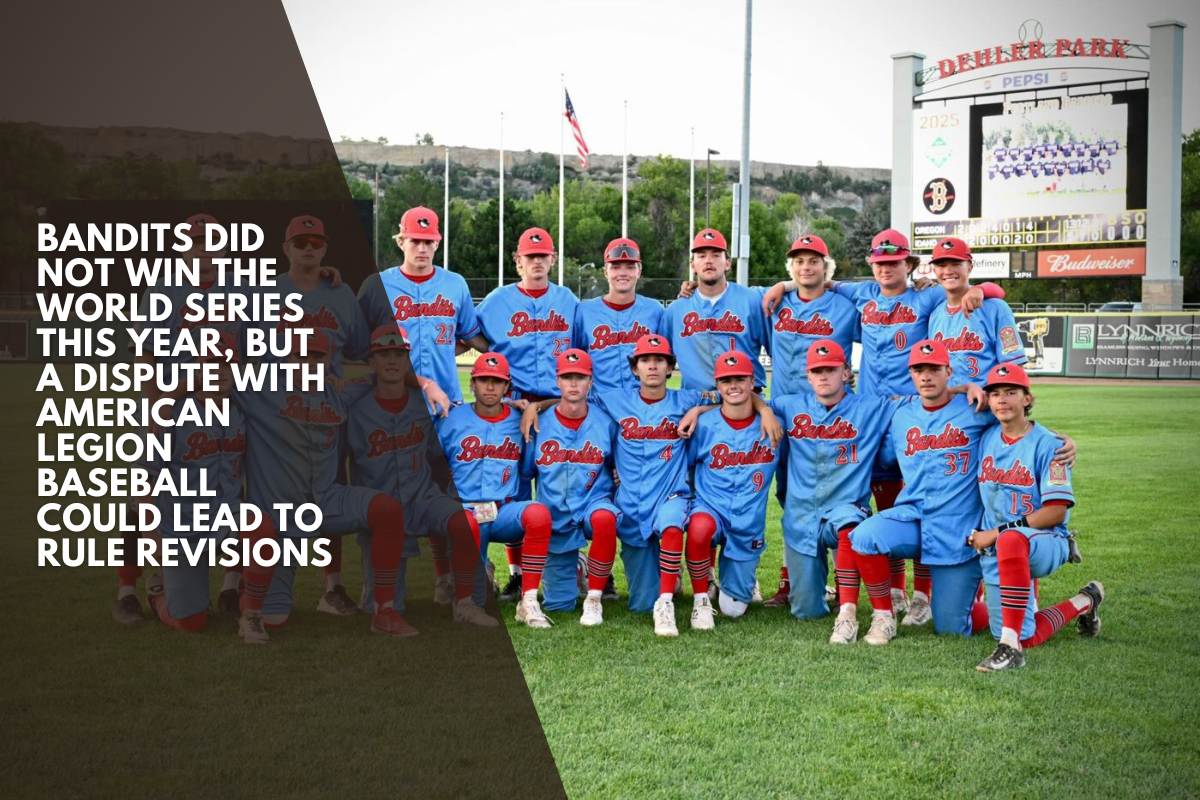IDAHO FALLS — Was the Idaho Falls Bandits baseball team denied a return trip to the American Legion World Series?
That’s a question that persists even weeks after the national tournament.
By the way, congratulations to Chesapeake, Virginia, on capturing the 2025 American Legion World Series title.
But, back in Idaho Falls, the sense that the American Legion system failed still hangs over the Bandits program like a chilly dark cloud.
WHAT HAPPENED?
The two-time World Series champion Bandits were one win away from advancing to another World Series back on Aug. 10 when they faced the Portland, Oregon, Barbers in the Northwest Regional final.
Oregon defeated the Bandits twice in an if-necessary game to win the Northwest Regional title and advance to the American Legion World Series.
If it were simply another baseball loss, everyone would accept it and go on with their lives. That’s how it works in sports.
But that is not the situation here.
While Idaho Falls and Portland played for the regional championship, things were considerably busier behind the scenes.
The Bandits filed an official protest, arguing that the Barbers’ roster based on school attendance violated American Legion standards.
HERE COMES THE MATH
Portland’s roster on their website differed slightly from the one presented for the postseason.
Rosters list both the player and their high school.
According to American Legion standards, each high school (10th through 12th grade) mentioned on the roster has a maximum enrollment of 7,500 students.
For example, if a team included five players from West HS (enrollment 1,200), five from East HS (enrollment 1,500), and eight from Central HS (enrollment 2,000), the team’s enrollment would be 4,700.
That is a simple example, but the fundamental truth is that teams cannot have more than 7,500 total enrollment on their roster, regardless of how many colleges they represent.
The school enrollment figure is critical to the Bandits’ protest.
According to the roster Portland presented to the Northwest Regional, their enrollment total was 7,196, which was significantly lower than the authorized number.
However, that number does not include La Salle Catholic College Preparatory School, which had three players on the team.
Why wasn’t La Salle counted?
According to the complaint, Portland obtained enrollment data from the website High-schools.com. Because La Salle is a private school, it was not listed on High-schools.com and was not included in the team’s enrollment figures, despite having three players on the roster.
The appeal emphasized that most teams rely on official enrollment numbers from their state education system for accuracy rather than third-party data.
According to the appeal, Bandits vice president Cliff Brady and other Idaho American Legion state leaders investigated the enrollment data and contacted the Office of the Registrar of La Salle, which confirmed the school’s enrollment of 492.
If La Salle had been counted, the Barbers’ enrollment would have surpassed the limit by 168.
The enrollment numbers were confirmed by East Idaho Sports by searching High-schools.com and privateschoolreview.com for La Salle.
Maybe the discrepancy was a clerical error? Maybe it was downright cheating?
Unfortunately, we’ll never know.
DENIED
Idaho Falls notified the regional tournament director that there was a problem with the Barbers’ roster, but they were told nothing could be done.
As the teams played, an appeal was filed with the American Legion’s national office, detailing the enrollment figures and the difference with Portland’s removal of La Salle.
Following the American Legion Appeals Board’s examination of the appeal, Steve Cloud, program director for the national American Legion office, answered via email.
“Pursuant to National Rule 9.D. eligibility issues must be filed with the national tournament director at each such tournament no later than 9 a.m. local time on the first day of the tournament. The roster you have provided is different from the approved roster the OR department chairman approved. Your roster includes additional players and high schools not listed on the approved roster. Additionally, Oregon Department rules state that “American Legion Baseball teams will use enrollment figures for the top three grades, 10th, 11th, and 12th grades from the resource area of the American Legion website or team registration site, i.e. www.High-Schools.com. Based on the verified enrollment numbers of the approved roster through High-Schools.com the Portland Barber’s enrollment combination is under 7,500. Therefore your appeal is denied.”
MORE PROTESTS
Brady responded to the denial by noting that the reference to rule 9.D. was incomplete.
From the American Legion rule book:
“9.D. National Tournament Player Eligibility Protest. Eligibility protests of players involved in national tournaments must bear written proof of ineligibility and must be filed with the department or national tournament director at each such tournament no later than 9 a.m. local time on the first day of the tournament involved, except upon discovery of a rules violation. When a rules violation is discovered, the eligibility protest and a written description of the alleged violation must be filed immediately and if a rules violation was committed, the player shall be ineligible and the team manager shall be suspended until further notice. All other protests shall be filed as specified in the Official Baseball Rules.”
The Bandits argued that “except upon discovery of a rules violation” was a key piece of the ruling that was overlooked.
Note: Regarding two different rosters, East Idaho Sports verified the roster against the roster that was used at the regional tournament. Seventeen of the 18 players listed were on the roster at the regional tournament, encompassing all eight schools, including La Salle.
The Bandits filed a second protest with the national office, claiming that the 9 a.m. deadline was irrelevant in this case due to new evidence discovered during the tournament about the enrollment discrepancies.
“We respectively request that the committee declare Oregon ineligible to play in the National Tournament in fairness to the other teams who follow the rules,” Brady stated in an email.
On the field, Portland celebrated a regional championship and a World Series berth, while the Bandits returned home to Idaho.
Ryan Alexander, Bandits’ longtime coach, was frustrated but remained focused on the field.
“They’re a really good team and they beat us twice on the field,” he informed me. “We could have done something about it… In no way does my inquiry into their enrollment invalidate them. They were the deepest American Legion team we’d ever seen.”
The Bandits are virtually American Legion royalty, having won two World Series titles and advanced to a third championship game since 2019.
Alexander said American Legion baseball is an organization he greatly respects, and the Bandits program and players have profited and loved their experiences year after year.
He expressed optimism that the American Legion did not become like travel baseball, where recruiting, borders, and scheduling are mostly unregulated.
“American Legion has a set of rules and I think it’s imperative that everybody knows you’re playing within those same guidelines and rules,” he told me. “Otherwise what you become is showcase or travel baseball … it’s find the best players you can find and put them on a roster and go compete.”
East Idaho Sports tried multiple times to contact Steve Cloud at the national American Legion headquarters, but received no answer.
WHAT’S NEXT?
The Bandits are expected to compete for another trip to the American Legion World Series in 2026. The foundation has already been set for a program that is not only tops in Idaho, but among the most successful in the nation.
But the regional tournament may have exposed a flaw in the American Legion system that will hopefully get fixed or amended.
“We keep a binder that has the boys’ signatures on agreements that they make on drugs or alcohol, behavior, and honor, in addition to their birth certificates, and legal documents that validate how old they are,” Alexander said. “That binder gets checked in Idaho during the course of the season, then at the state tournament, and again at the regional tournament, and for the last time at the national tournament. I’m packing around a physical binder for the leadership to check … Nowhere in that binder is there anything about school enrollment or which schools are represented within the recruitment plan …”
Alexander said he doesn’t fault the regional director or the national leaders because they didn’t have the time to do a full investigation on the Portland roster once the playoffs are fully underway.
All of the information regarding enrollment and recruiting should be required to be in the binder and signed off by each state’s American Legion officials so that all teams and rosters are verified before they reach the regional and national tournaments, Alexander said.
“I feel we have to trust state leaders at each of the 50 programs. They have got to do their due diligence and make sure that teams competing within their state are following the guidelines and rules laid out,” he said. “And if they’re not, take care of it before the national-level tournaments … It needs to be worked out so there can be necessary changes made so that everybody has confidence that it’s the same set of rules.”
Do specific rules need to be changed?
“I do think there needs to be some kind of verification at the state level so that the other states can have confidence that what they’re facing is a true picture of competitive quality,” Alexander said.
Brady, the program’s vice president, agreed that adding enrollment numbers and recruiting plans to each team’s required binders would help eliminate the issue of having to verify rosters at the national tournaments.
“I think it’s a black eye for national,” Brady said of the whole process. “I get it would be embarrassing, but at a minimum, don’t just tell me my numbers were wrong …”
Brady said there was no response from the national office after he objected to the second protest being denied.
“Ryan, like any coach, would have just preferred to beat them,” Brady said. “I said, if they’re playing by a different set of rules … I did this (appeal) to protect the work that our players put in. They put in the work and the effort and they did it within the rules. And it was taken away from them by a team who was not within the rules, and I don’t think that’s right. I don’t think American Legion baseball should have stood by that, but they did.”












